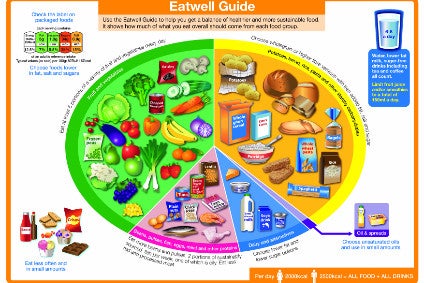
New healthy eating guidelines from Public Health England calling for a cut in dairy consumption have been called “baffling and disappointing” by representatives of the dairy industry.
In its Eatwell Guide, released this morning (17 March), PHE called on consumers to boost their consumption of starchy carbohydrates as well as eating “at least” five portions of fruit and vegetables per day.

Discover B2B Marketing That Performs
Combine business intelligence and editorial excellence to reach engaged professionals across 36 leading media platforms.
“The evidence shows that we should continue to base our meals on starchy carbohydrates, especially wholegrain, and eat at least 5 portions of a variety of fruit and vegetables each day,” Dr Alison Tedstone, chief nutritionist at PHE, said.
The public health body reduced its recommendations for dairy consumption, saying that people should eat “some” dairy or dairy-alternatives such as soy, but should focus on low fat options.
The shift prompted Dairy UK CEO Dr Judith Bryans to describe the move as “both baffling and disappointing”.
Dr Bryans commented: “In the UK, dietary guidelines disregard an ever-growing body of robust, science-based evidence which stresses the importance of dairy consumption at all ages. It is genuinely disconcerting to see that the dairy food group being disadvantaged by a public health campaign. At a time when obesity is a real crisis for children and adults alike, nutrient-dense whole foods such as dairy products should be put front and centre in dietary guidelines.”

US Tariffs are shifting - will you react or anticipate?
Don’t let policy changes catch you off guard. Stay proactive with real-time data and expert analysis.
By GlobalDataAccording to Dr Bryans, the advice also flies in the face of the government’s own assessment of dairy consumption, including the latest Scientific Advisory Committee on Nutrition (SACN) report on carbohydrates and human health and the recent Dairy All-Party Parliamentary Group recommendations on dairy and public health. Dr Bryans also stressed that the UK government exempted dairy from the sugar tax introduced in yesterday’s Budget announcement.
PHE also took specific aim at smoothies. The body said that smoothies should now only be counted as “one of your five a day” in recognition of their high sugar content. PHE suggested that consumption of smoothies and fruit juices should be limited to 150 ml per day.
“On the whole, cutting back on foods and drinks that are high in saturated fat, salt, sugar and calories would improve our diets, helping to reduce obesity and the risk of serious illnesses such as heart disease and some cancers. A smoothie, together with fruit juice, now only counts as one of your five a day and should be drunk with a meal as it’s high in sugar,” Dr Tedstone commented.
PHE said that it was “deeply concerning” that only one-in-five UK consumers eat five items or more of fruit and vegetables per day. The body therefore unveiled a redesigned five-a-day logo and made it “free and easier to use” on packaging to “help consumers” make healthier choices.
In addition, PHE took some emphasis off of meat consumption and said that people should also eat beans and pulses as a source of protein.
This focus was welcomed by environmentalists, ,who said it was a gateway to more sustainable consumption patterns. Brigitte Alarcon, sustainable diets business and policy officer at WWF-UK said: “By placing an emphasis on the need to reduce our meat consumption and to diversify our protein intake by including pulses and beans, the Eatwell guide is a positive step. It could help move the UK towards the faster adoption of diets that are better for our health and the planet, helping to encourage a reduction in greenhouse gas emissions from the food supply chain.”
Click here to view terms PHE’s revised licensing guide for the five-a-day logo.





